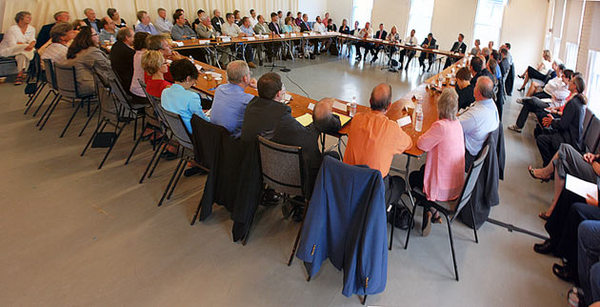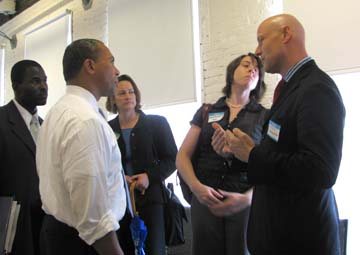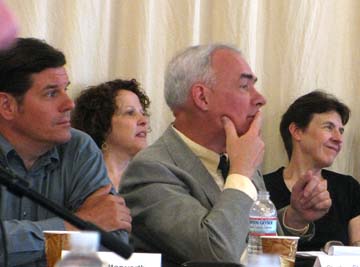
'Creative Districts' Suggested to Support Cultural Endeavors
 Gov. Deval Patrick speaks with Kevin Sprague at Thursday's creative economy roundtable. |
"This is the creme de la creme of the people who are making it happen," said Mayor John Barrett III in introducing Gov. Deval Patrick to the 70-odd entrepreneurs, museum and theater directors and other nonprofit boosters of the county. "But I also believe they are going to lead us into the future."
Representatives from some 120 organizations were invited to participate in the roundtable discussion with Gov. Deval Patrick, who toured two galleries and a local dot-com, Waterfront Media, in the morning.
"I'm increasingly struck by the opportunity presented by a strong cultural element," said governor. "How do we build on that even at a time of scarce resources?"
The conversation ranged from how the Massachusetts Office of Travel and Tourism was marketing the region to how filmmakers could be persuaded make the Berkshires a backdrop to how the area itself could provide housing and jobs for the creative individuals needed to ensure a strong cultural base.
"I can look around the table and tell you who's in trouble. Some of these jewels are hanging by a thread right now," said Kevin Sprague of Berkshire Creative. "People have lost hundreds of jobs in the creative sector this year and there hasn't been a whisper."
One obstable he and others saw was the ability for cultural enterpreneurs and developers to get the capital backing for new ventures, such as theaters or housing.
Artist and real estate developer Eric Rudd said projects like his Eclipse Mill are difficult to do because of the limited profitability. The studio/living condominiums in his mill sold out before they were completed, showing there was a market for medium-priced artists' housing. But break-even ventures don't attract a lot of capital.
"That kind of project would be successful today except there would be no profit," he said, and so no developer willing to invest in it. Instead, there's capital backing for high-end housing on one side and low-income housing on the other. "But in the middle of the road, the numbers don't work."
 Brian Butterworth, left, of the Red Lion Inn and Williams professor Stephen Sheppard. |
"Conventional finance won't work," said state Rep. Daniel E. Bosley. Banks have to get involved, he said, but are limited because of regulatory issues.
On top of suitable housing, artists coming into the area required jobs that fit their talents, said Brian Handspicker, president of the Berkshire Artists Colony.
"We really are talking about struggling and starving artists," he said.
Williams College economics professor Stephen Sheppard suggested greater collaboration between nonprofits, municipalities and businesses through the creation of creative investment or improvement districts, not unlike economic development zones.
Sheppard is the director of the Center for Creative Community Development (C3D) at Mass MoCA, which is currently doing research on 25 cities across the country, including North Adams, to quantify the impact of nonprofits on local economies. The center completed a report on the effects of Mass MoCA several years ago.
"The public funds invested in Mass MoCA for example, generated an increase in local commercial and resident housing values that way exceeds the public investment in it," he said. A creative district "will allow communities and local businesses to work to support nonprofits that are absolutely essential to the Berkshire economy."

















